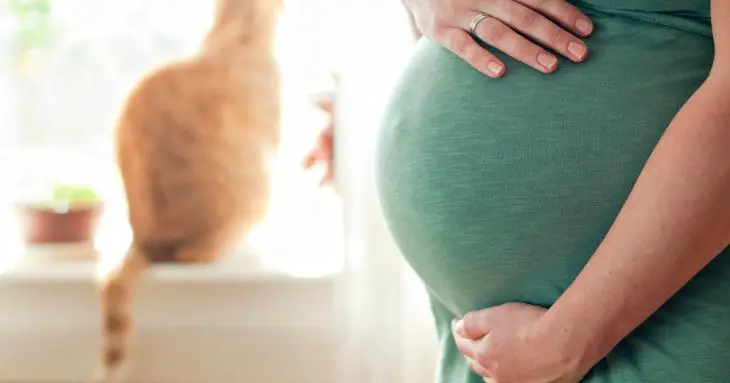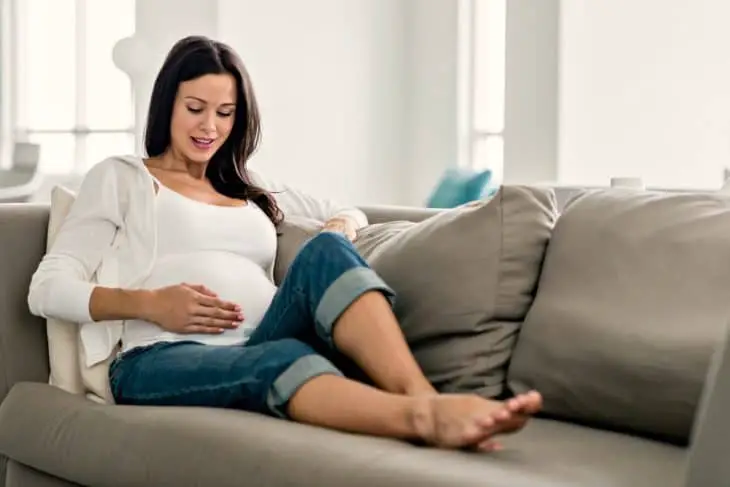
Pregnancy can be a delightful time in a woman’s life – it can also be a time fraught with discomfort. For example, babies kick and move, and sometimes this awesome experience is flat-out uncomfortable. Do you feel like you have a baby kicking bladder problem? You are not alone.
When I was pregnant with my son, I often felt like he was kicking me in the bladder making me uncomfortable and forcing me to run to the restroom.
As much as I loved feeling his little kicks, I wanted these particular kicks to ease up. Let’s look at this feeling and some ways to deal with it.
What Does It Feel Like?
During pregnancy, it becomes easier to identify your baby’s kicks. As your pregnancy progresses, you will be able to clearly identify a kick from gas. However, the easiest way to describe the feeling you have when your baby is kicking your bladder is a quick sharp twinge to your bladder.
If you feel a twinge towards your bladder (or feel a sharp twinge in your urethra), this may be your baby kicking his/her little feet against that sensitive area. For some women, the sudden twinge is an alert to go to the restroom; for others, it passes as quickly as it starts.
However, you should be aware that as your pregnancy progresses, you may feel pressure on your bladder more often. As your baby grows and takes up more space in the womb, it is common for women to feel pressure on their bladders making them need to urinate frequently.
When Does It Occur?

According to American Pregnancy, moms should begin to feel their babies kick around 18-25 weeks into pregnancy. First time moms may feel kicks closer to 25 weeks, where second time moms may notice them earlier. As your baby grows, the kicking sensation will become more prevalent.
Furthermore, babies also develop a sleep cycle while in the womb. Therefore, they are more active at certain times of the day. You will grow more aware of your baby’s patterns of rest and activity because of the kicks and movement.
Babble writes, “Fetal movement can increase after eating, drinking something sweet, or physical activity. Active periods can also be seen between the hours of 9pm – 1am, as your blood sugar levels are dropping.” Also, certain foods and beverages may cause more fetal activity.
What May Be Happening
In the beginning, what you may be feeling is not actually kicks. It is the baby flipping. As your baby grows stronger, you will feel the baby poke, jab, or kick. As you baby moves around the womb, some of these pokes and kicks may end up near your bladder.
According to LiveStrong, “You might feel an occasional sharp jab or kick in your rib cage, abdomen or cervix as your baby increases in size and strength.” They also suggest that a sharp pain in the vaginal wall towards the end of pregnancy may signify that your cervix is beginning to dilate.
How to Find Relief

The best way to find relief from uncomfortable kicking is to change position. Some women notice laying down or doing yoga helps. Often, if you change position, your baby will move. This may help your baby move off your bladder and into a more comfortable position for you.
Pay Attention to Kicks
While you may feel uncomfortable, it is actually crucial for you to pay attention to your baby kicks. Doing kick counts is one way to prevent stillbirth. So, while you may be uncomfortable, feeling your baby kick is a healthy sign.
American Pregnancy explains, “The American Congress of Obstetricians and Gynecologists (ACOG) recommends that you time how long it takes 10 kicks, flutters, swishes or rolls. Ideally, you want to feel at least 10 movements within 2 hours.” Find a comfortable spot to rest and take notice.
Other Possibilities or Causes for Concern
While it is common to feel like your baby is kicking your bladder, you should still pay attention to your body. Parents suggests that if you feel severe pain or pain that is prolonged, you should seek medical help. This may be a sign of a more serious issue such as an ovarian cyst, a defect in the uterine wall, or a bladder infection.
Additionally, if you have trouble counting the recommended number of kicks when you track your kicks, or if you notice a significant decrease in fetal movement, you should contact your doctor.
To Wrap Up
If you are feeling sharp twinges towards your urethra, your baby may be kicking your bladder. This sudden pain should either make you feel the need to urinate or pass quickly. As babies move and grow, their movements and kicks may be uncomfortable. But, at the end, your baby will be sleeping in your arms.
After reading this article, do you have any questions? Please let us know your thoughts in the comments.

